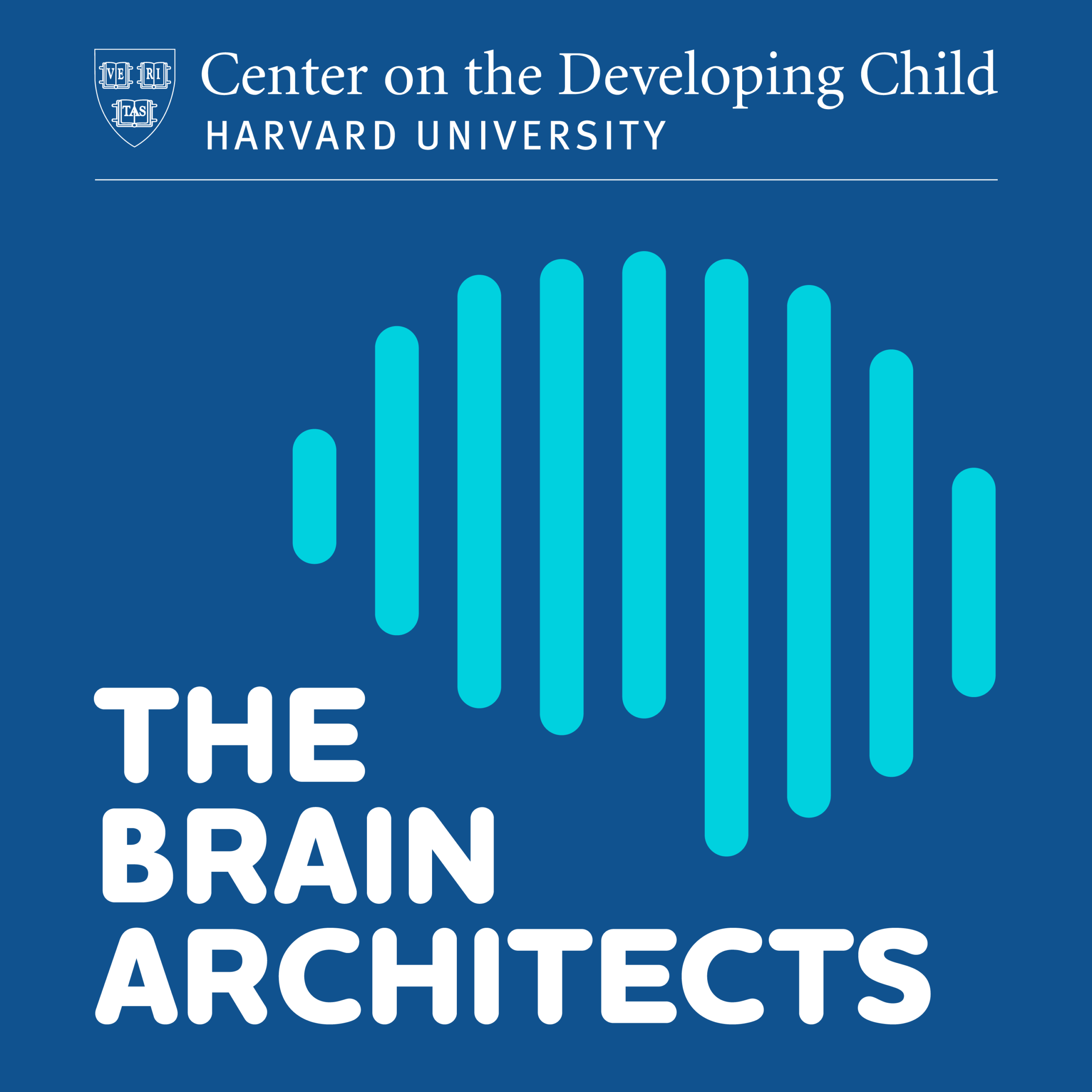Toxic Stress: Protecting the Foundation
Description
What is toxic stress? What effects can it have on a child’s body and development, and how can those effects be prevented? What does it mean to build resilience? This episode of The Brain Architects explores what “toxic stress” means, and what we can do about it.
Host Sally Pfitzer is once again joined by Center Director Dr. Jack Shonkoff as they dive into the different types of stress, including what makes certain stress “toxic,” while other stress can be tolerable or even positive for children. They discuss the effects that toxic stress can have on developing brains, as well as what it means to be resilient to sources of stress, and how parents and caregivers can help encourage that resilience in children. Dr. Shonkoff also emphasizes the point that, even for those who may have experienced toxic stress, “it’s never too late to make things better.”
Then, listen to a panel discussion featuring Pediatrician Dr. Kathleen Conroy, Community Mental Health Worker Cerella Craig, Professor and Researcher Dr. Megan Gunnar, and Training Director for Rise Magazine Jeanette Vega, as they discuss the various ways in which they encounter toxic stress and its effects in their work. The panelists speak openly about how toxic stress can affect families and children—including ways in which the systems set up to help can be the cause of further stress—and how to talk about toxic stress in a way that doesn’t make things feel hopeless to those who have experienced it. They also dig into strategies they employ in their various fields to help children and families deal with stress, and move what might be toxic stress back to tolerable levels. Download the episode and subscribe to the podcast today.
Panelists
<figure id="attachment_4985" aria-describedby="caption-attachment-4985" style="width: 125px" class="wp-caption alignnone">
 <figcaption id="caption-attachment-4985" class="wp-caption-text">Dr. Kathleen Conroy, Associate Clinical Director, Boston Children’s Primary Care, and Assistant Professor, Harvard Medical School</figcaption></figure>
<figcaption id="caption-attachment-4985" class="wp-caption-text">Dr. Kathleen Conroy, Associate Clinical Director, Boston Children’s Primary Care, and Assistant Professor, Harvard Medical School</figcaption></figure><figure id="attachment_4986" aria-describedby="caption-attachment-4986" style="width: 125px" class="wp-caption alignnone">
 <figcaption id="caption-attachment-4986" class="wp-caption-text">Cerella Craig, Community Mental Health Worker, New Haven, CT</figcaption></figure>
<figcaption id="caption-attachment-4986" class="wp-caption-text">Cerella Craig, Community Mental Health Worker, New Haven, CT</figcaption></figure><figure id="attachment_4987" aria-describedby="caption-attachment-4987" style="width: 125px" class="wp-caption alignnone">
 <figcaption id="caption-attachment-4987" class="wp-caption-text">Megan Gunnar, Professor and Director of the Institute of Child Development, University of Minnesota</figcaption></figure>
<figcaption id="caption-attachment-4987" class="wp-caption-text">Megan Gunnar, Professor and Director of the Institute of Child Development, University of Minnesota</figcaption></figure><figure id="attachment_4984" aria-describedby="caption-attachment-4984" style="width: 125px" class="wp-caption alignnone">
 <figcaption id="caption-attachment-4984" class="wp-caption-text">Jeanette Vega, Training Director, Rise magazine</figcaption></figure>
<figcaption id="caption-attachment-4984" class="wp-caption-text">Jeanette Vega, Training Director, Rise magazine</figcaption></figure>Additional Resources
Resources from the Center on the Developing Child
- A Guide to Toxic Stress
- Stress and Resilience: How Toxic Stress Affects Us, and What We Can Do About It
- Infographic: What We Can Do About Toxic Stress
- Infographic: ACEs and Toxic Stress: Frequently Asked Questions
- Key Concepts: Resilience
- Resources Regarding the Separation and Detention of Migrant Children and Families
- Three Principles to Improve Outcomes for Children and Families
- Science to Policy and Practice: Applying the Science of Child Development in Child Welfare Systems
- InBrief: Applying the Science of Child Development in Child Welfare Systems
- Working Paper: Excessive Stress Disrupts the Architecture of the Developing Brain
- Working Paper: The Science of Neglect: The Persistent Absence of Responsive Care Disrupts the Developing Brain
Resources from Our Panelists
Jeanette Vega
- RISE TIPS: Visits With Children in Foster Care
- RISE TIPS: Service Planning
- Risemagazine.org features lots of stories by parents involved in the child welfare system for other parents.
Transcript
Sally: Welcome to The Brain Architects, a new podcast from the Center on the Developing Child at Harvard University. I’m your host, Sally Pfitzer. Our center believes that advances in science can provide a powerful source of new ideas that can improve outcomes for children and families. We want to help you apply the science of early childhood development to your everyday interactions with children, and take what you’re hearing from our experts and panels and apply it to your everyday work. In today’s episode, we’re going to explore this concept called toxic stress, which is a buzzword you may have heard and potentially used incorrectly. So we’re going to discuss what toxic stress is and what it can do to a child’s body and development, and we’ll learn a little bit more about what we can do to counteract its effects. Here to discuss this topic of toxic stress with us is professor of child health and development and the director of the Center on the Developing Child, Dr. Jack Shonkoff. Hey Jack.
Jack: Hey Sally.
Sally: So glad to have you back with us today.
Jack: Great to be here.
Sally: Today, we’re digging into a topic that has quite a bit of research around it and a lot of different ideas out there in terms of what it actually is and how it affects children’s brains. And this is the topic of toxic stress. So from your perspective, could you just give us a little bit of background on what is toxic stress and how did the term come to be?
Jack: This is a really important one to talk about. The story starts with
a group of scientists working together to figure out how to make biological aspects of stress understandable for the public. When we talk about stress, we’re talking about not the thing that causes stress, but the body’s response to stress, what’s going on inside of our bodies biologically. And in the culture in the United States, there’s no sympathy for stress. To think about the impacts of stress on children is something we should worry about. It’s a roadblock of people saying, “Let them just suck it up and get over it.” But you can’t ask babies to pull themselves up by their bootstraps. So, the





